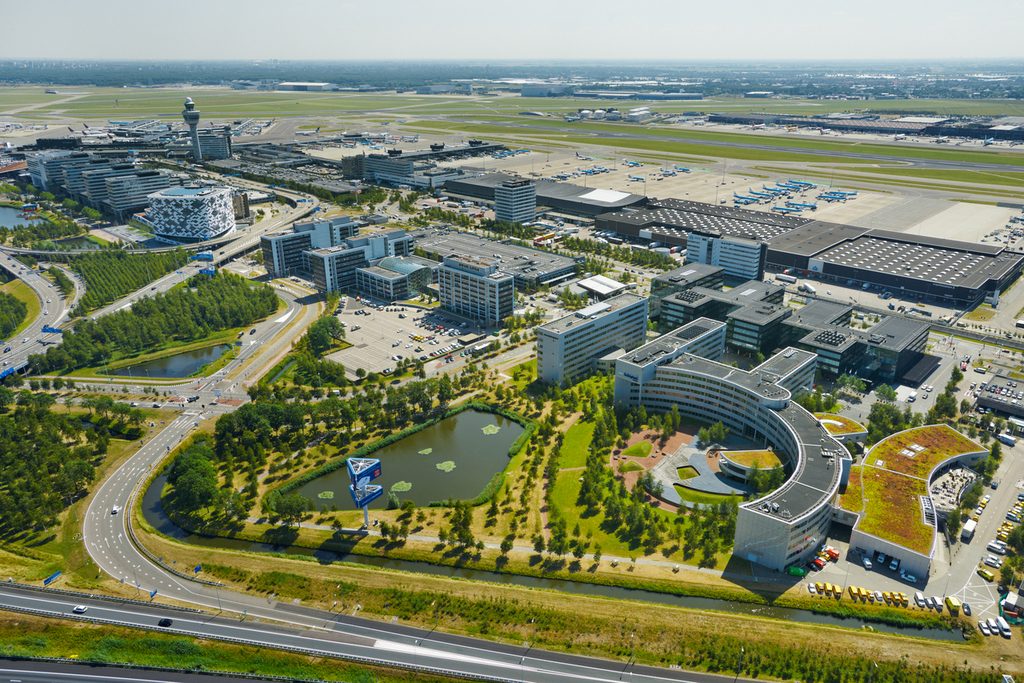Business model: AirportCity-formula
The most important airport in the group, Amsterdam Schiphol Airport, has been developed as an AirportCity where travellers, airlines and businesses can access all the services they need, 24 hours a day. Schiphol continues to distinguish itself through the development of a wide range of commercial activities. Three complementary and mutually reinforcing business areas form the cornerstones of the AirportCity concept: Aviation, Consumer Products & Services and Real Estate.

Businessmodel
Serving travellers, airlines, handling agents and logistic services providers alike, the Aviation business area plays a pivotal role at the airport. Aviation supplies and manages the infrastructure needed to ensure pleasant, reliable and efficient arrival and departure processes for travellers, baggage and cargo. It is responsible for coordinating safety in the terminal, on aprons and roads, and in airside areas and buildings.
The Consumer Products & Services business area offers travellers a range of products and services that facilitate a carefree and comfortable travel process. It includes shops, catering facilities and parking services at the airport. In addition, the business area markets advertising opportunities at the airport.
The Real Estate business area develops and manages real estate at and around the airport. The central task of this business area is to ensure that the airport area offers attractive business locations and a pleasant environment. We offer a wide diversity of first-class real estate such as the new Hilton Hotel, office buildings, logistics buildings and leased premises in the terminal.
Our fourth business area, Alliances & Participations, is focused on the operation of regional airports and the development of international business activities. Like Schiphol itself, the regional airports are developed on the AirportCity model through investments in real estate and the creation of an attractive range of shops, hotels and restaurants. We also export our AirportCity concept and operational expertise to airports abroad, thereby generating income and gaining new insights for the development of Mainport Schiphol.
Schiphol Group is more than the sum of its four business areas or a collection of airports; by tapping into the operational and commercial knowledge and innovative capacity in every part of the group, including our foreign interests, the group as a whole can remain strong, agile and distinctive within the aviation industry.
The operation of these airports is governed by a management model that enables Schiphol Group to make maximum use of the expertise of sector and business partners in the value chain, thus both promoting flexibility within the group and offering economies of scale. We participate in various partnerships for the joint development of innovative concepts and solutions, as well as in joint procurement initiatives, where possible.
All four business areas contribute to Schiphol Group's results. The group derives its income from a range of sources, including airport charges and passenger charges, concession fees from retail and catering companies, revenue from advertising and parking services, property rents and leaseholds and income from associates.
Regulation Our income differentiates between regulated and non-regulated flows, in what is known as a dual-till system.
Rates for aviation activities at Amsterdam Airport Schiphol are regulated. The scope available to Schiphol Group for charging costs directly related to its primary airport operations, infrastructure and security is largely fixed. The rates, including take-off and landing fees and passenger and security charges that Schiphol receives from the airlines, are periodically determined in accordance with legal provisions in the Dutch Aviation Act.
The return on aviation activities has been capped at the regulated average weighted cost of capital (WACC) determined annually, on which the ten-year interest rate on government bonds has a considerable impact. This means that Schiphol Group's return on aviation activities depends on the development of the interest rate.
Non-aviation activities at Schiphol are not regulated. They include all activities related to retail, catering, leases, media, real estate development, parking, car parking fees as well as our international activities. The operation of our regional airports is not regulated either. Our non-regulated revenue flow contributes substantially to the group's financial results, allowing us to maintain a healthy financial position. Both our aviation and non-aviation activities contribute to the fulfilment of our mission: connecting the Netherlands with the rest of the world.